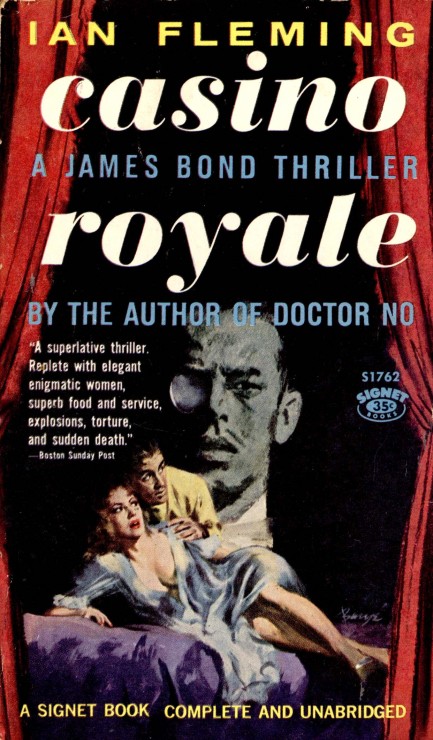| Vintage Pulp | Apr 19 2018 |

Bond is born in Ian Fleming's 1953 Cold War thriller.

We've read a few Bond novels, but not his debut in 1953's Casino Royale. When it comes to secondhand bookstores and yard sales you read what you find. But we decided to finally make a deliberate effort to go back to the beginning with an edition from Signet, which appeared in 1960 with Barye Phillips cover art. The debuts of franchise characters leave room for continuing adventures by design but we've never read a book that was so deliberately a prequel as Casino Royale. It's the essential novel for understanding Bond. You know the basics already: Cold War intrigue, opposing teams taking the field for a long struggle, a Soviet spy named La Chiffre who's dipped into funds not his and who hatches a desperate plan to restore them via the baccarat tables of a famous French casino, Bond dispatched to outplay him, break him, and ensure his downfall for stealing the money.
The book is fantastic from its opening, through its tremendously tense middle sections, and on to its brutal punchline of an ending. Bond is imperfect as both a spy and a man. He's sometimes kind, prone to sentiment, and philosophical about his work; he's also sexist, racist, and generally regressive. Casino Royale is designed to explain how the first three qualities were destroyed, making him a perfect spy. The latter three qualities remain. While in serious fiction many authors of the period were writing about racial equality and the essential sameness of people, Ian Fleming was declaring that Asians are terrible gamblers because as a race they lack resolve. None of this is a surprise because much is known about Fleming's personal views. Bond is an icon, but of a less enlightened era. We're readers, of ours. Yet we can meet on the page, and—with a tolerance Fleming never showed others—still manage to have a little fun.
The book is fantastic from its opening, through its tremendously tense middle sections, and on to its brutal punchline of an ending. Bond is imperfect as both a spy and a man. He's sometimes kind, prone to sentiment, and philosophical about his work; he's also sexist, racist, and generally regressive. Casino Royale is designed to explain how the first three qualities were destroyed, making him a perfect spy. The latter three qualities remain. While in serious fiction many authors of the period were writing about racial equality and the essential sameness of people, Ian Fleming was declaring that Asians are terrible gamblers because as a race they lack resolve. None of this is a surprise because much is known about Fleming's personal views. Bond is an icon, but of a less enlightened era. We're readers, of ours. Yet we can meet on the page, and—with a tolerance Fleming never showed others—still manage to have a little fun.




































































